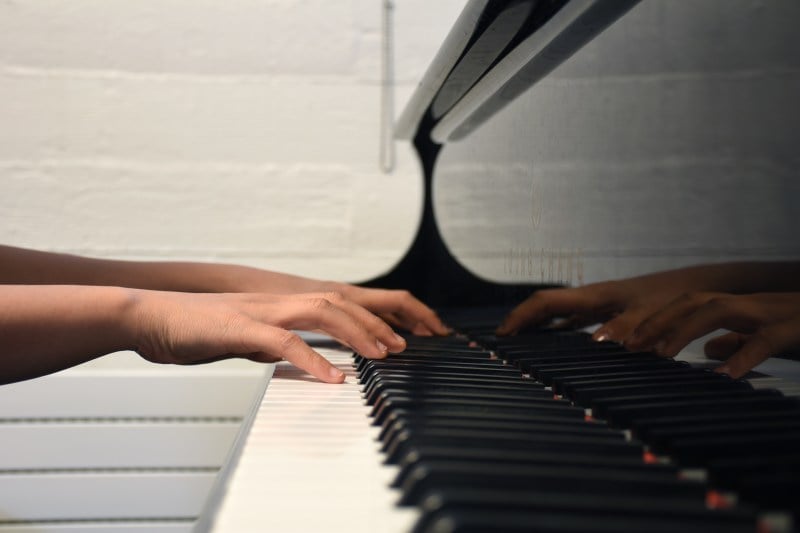I unravel my headphones from a wad of cords. A few bars of soft piano filter through the wires. For a moment, I still hear my piano teacher: “Rubato at the end of that measure. That’s it. Accentuate the top notes. Not too much, no, you’re making them sound staccato.”
And then I remember that I stopped playing piano a year ago. I’m not a pianist anymore. My job is no longer to puzzle over key changes and work out the interpretation; my job now is to listen.
It’s a role I’m still growing used to. My thoughts falter when I think of myself as a musician in the past tense; I had never really, after all, intended to quit. I had taken a hiatus in order to focus on college applications, fully intending to return when I finalized my choice in the spring. But life took the better of my plans; I deferred my return date to after finals. Then, after graduation. Then, after my summer trip.
In between, I practiced sporadically, vainly attempting to maintain my waning skills with a round of Hanon exercises and a few sight reading drills. I set lofty sights on summer vacation: I could practice for hours a day and become a pianist in college again.
But I didn’t.
Last week, I told the stories of four Stanford freshman who gave up their musical instruments in the months preceding college. The narrative is something to which I have a personal stake; for this week, I add my own. I too am — was — a musician, and the decision to leave behind something I loved did not come easily. I still grow nostalgic when I see the grand piano that stands just yards from my door; I still feel emotional when I listen to the songs that I once played on my own.
I still remember my own voice as a little girl, telling my parents that I “can’t go too long without playing the piano because I need it in my life.” I wonder what happened to that little girl because it’s been an entire year since I last touched the ivories with any degree of seriousness.
It’s been an entire year since my music has gone silent.
The same creeping guilt, which I always felt when I forgot to practice before lessons, still crouches in the recesses of my mind. Part of me still clings desperately to the impossible: I’m just on hiatus, putting off my lessons until I have the free time to start them again. The other part of me presents the stark reality: I will never have the free time for piano. My time will only grow thinner with each quarter, with each class, with each extracurricular commitment. And I ought to stop feeling guilty for not doing something that is no longer my obligation.
It’s strange too to think that I miss an activity that I had spent 12 years complaining about. When I first stopped my lessons, my parents enthusiastically supported me — at last, they were free of their duty to pester me about practice! My parents and I had many a piano-related fight in the last decade, and we were all too glad for a reprieve from the source of conflict. In all honesty, I had never been particularly devoted to the piano; I went through sporadic periods in which I practiced the necessary discipline, but I was, on the whole, a somewhat lazy musician.
It may seem impossible, therefore, to reconcile the fact that I both loved and hated the piano. I had previously considered quitting on multiple occasions, yet each time I felt an impossible draw to the instrument. Through all of the years that I had spent at the piano bench, music had burrowed itself into a corner of my mind. I return to it at my most vulnerable — at times when I desperately seek mental peace.
And that love for music has never waned. It has found alternative channels, where it waits as an old friend would for me to revisit its calm embrace. I found, for instance, that I now listen to music more frequently. I developed substitutes for the emotional outlet that I once had in piano — creating playlists for each mood, bursting out in song when I think no one’s listening. (Actually, most people in my dorm have probably heard me sing at least once. The secret’s out. Sorry, guys.)
My 12 years of music are not, indeed, like the songs that I played — evaporating into thin air once the final notes concluded. Rather, they have left gentle marks upon me. There were the physical habits of a musician: sitting on the front third of a chair, keeping my nails trimmed low, refusing to wear a watch that imbalanced the weight on my wrists. More subtly, there was the subtle swinging along to any sort of beat, the ear for when something was out of tune, the ability to catch onto songs faster.
I may no longer be a pianist, but I am still, I realize, a musician. And who is to say that I won’t one day be a pianist again?
Years ago, my piano lessons occupied the time slot directly after that of a middle-aged student. And I will always remember his words, which he repeated each time he left: “Remember. Piano is something that you can keep doing until you’re 80. You might wear yourself out in other physical activities, but music lasts forever.”
Contact Xinlan Emily Hu at xehu ‘at’ stanford.edu.
